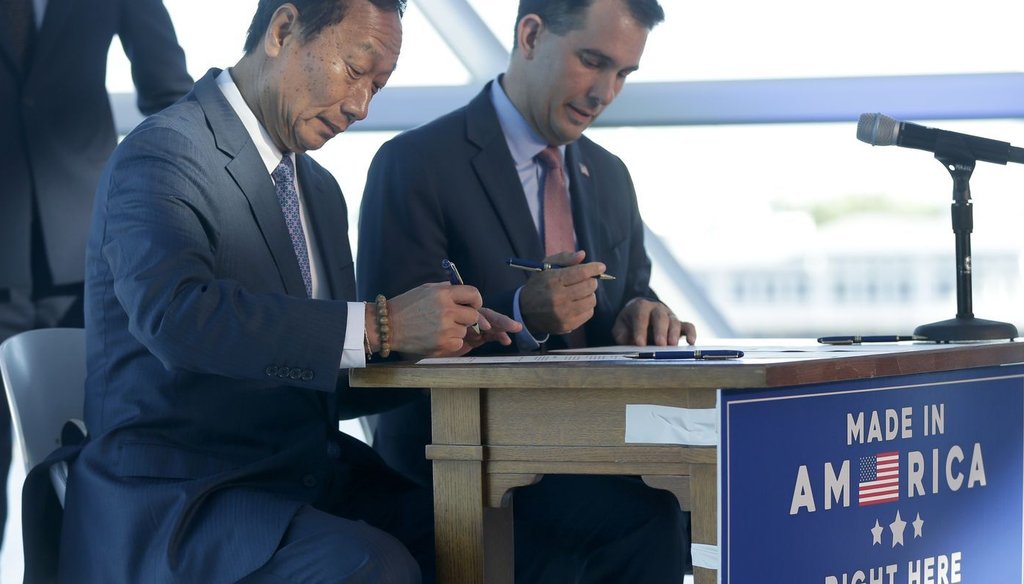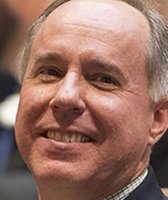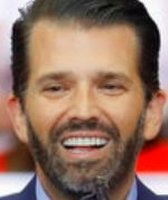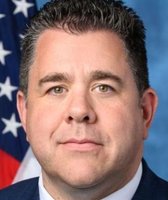Stand up for the facts!
Our only agenda is to publish the truth so you can be an informed participant in democracy.
We need your help.
I would like to contribute

Foxconn chairman Terry Gou (left) and Gov. Scott Walker have signed a memorandum of understanding for Foxconn to build a manufacturing plant in Wisconsin, but it doesn't contain specific requirements. (Mike De Sisti/Milwaukee Journal Sentinel)
Yes, Foxconn deal was largest government incentive package offered to a foreign company
If Your Time is short
-
Good Jobs First, a nonprofit that tracks subsidy deals for businesses, still ranks Foxconn as the largest megadeal made with a foreign company as of spring 2021.
-
It’s close to one of the largest deals overall, only trailing deals made with Boeing and Alcoa, both American companies.
-
Kleefisch was a strong proponent of the deal. She said she met with Foxconn officials during a 2015 trade mission to Taiwan, broadly discussing what Wisconsin would have to offer the company.
Wisconsin’s former Lt. Gov. Rebecca Kleefisch announced a bid for governor Sept. 9, taking shots at Democratic Gov. Tony Evers’ handling of the COVID-19 pandemic and touting her own credentials.
Kleefisch, a Republican from Concord, served for eight years as former Gov. Scott Walker’s second-in-command.
One thing she didn’t mention in her announcement: the Foxconn deal that came to define the final years of Walker’s governorship, a deal she touted.
In 2017, Walker signed off on an agreement that called for the Taiwanese tech company to build a liquid crystal display panel factory in Mount Pleasant, which was to lead to the creation of 13,000 jobs, many of them in high-tech manufacturing.
In return, the state would provide $3 billion in incentives to the company.
Sign up for PolitiFact texts
Since the deal was announced, Foxconn abandoned plans for the LCD screens, then a later plan for robotic coffee kiosks, as well as its promise to create as many jobs. Most recently, the company signed a renegotiated deal with the Wisconsin Economic Development Corporation to hire 1,454 full-time workers by 2025 in return for up to $80 million in tax credits.
In a Twitter thread criticizing Kleefisch, chair of the Democratic Party of Wisconsin Ben Wikler pointed out her support for the Foxconn deal.
"Kleefisch played a key role in negotiating the disastrous Foxconn deal, the largest attempted government handout to a foreign company in American history," he tweeted.
Is Wikler right that she played a key role, and that it was the largest attempted handout to a foreign company in the country’s history?
Let’s take a look.
When the deal was made, it was the largest government subsidy given by a state to a foreign company.
In 2017, PolitiFact Wisconsin wrote that the Foxconn incentives would exceed the previous highest deal with a foreign company, which was a $1.65 billion package given by the state of Pennsylvania to Netherlands-based Dutch Royal Shell.
The 2017 item cited Good Jobs First, a Washington, D.C. nonprofit that calls itself "a leading monitor and critic of company-specific subsidy deals." (They criticized the Foxconn deal, calling it "a sure loser" for Wisconsin taxpayers.)
In the nonprofit’s list of megadeals last updated in April 2021, Foxconn’s deal ranks third-highest, following Boeing and Alcoa, both U.S. companies. That would make the Foxconn deal the largest package offered to a foreign company.
Nathan Jensen, a professor of government at the University of Texas-Austin who researches business-government relations, agreed in an email that the size of the package in dollars would make it nominally the biggest deal given to a foreign company "and one of the biggest deals period."
The Foxconn incentives were also partially front-loaded and spread out over a shorter time period than other billion-dollar deals, making it an even more lucrative package, Jensen wrote.
So Wikler is on track that the Foxconn incentives were the largest offered to a foreign company.
Featured Fact-check
But while he’s right about the size of the deal, he’s a bit off base in describing it as a handout, even an attempted one. The taxpayer-backed payments were contingent on the company meeting specific thresholds of jobs created.
Even under the smaller, renegotiated deal, those thresholds haven’t been met and none of the prescribed payments have been made.
In response to a query from PolitiFact Wisconsin, Kayla Anderson, rapid response director at the Democratic Party of Wisconsin, sent several links to news articles detailing Kleefisch’s involvement with the deal.
Chief among them was her 2015 trade mission to Japan and Taiwan. Two years later, she said she’d met with Foxconn officials on that trip, not discussing specifics but rather a "general, wide-ranging conversation" about what the state had to offer if the company expanded there.
Kleefisch also said personal relationship-building and face-to-face meetings were important to convey security, stability, quality and value while getting the deal done.
While the definition of a "key role" might be subjective, there’s no question she was a strong proponent and was pushing for the deal.
Wikler said Kleefisch played a key role in the Foxconn deal, "the largest attempted government handout to a foreign company in American history.
Kleefisch did meet with Foxconn officials and promoted the deal publicly before, during and after its creation.
And the $3 billion incentive package still stands as the largest one offered to a foreign company. But calling it a handout isn’t exactly accurate — the payments had specific rules attached to them, without which Foxconn couldn’t get the money.
We rate his claim Mostly True.
Our Sources
Milwaukee Journal Sentinel, "Former Wisconsin Lt. Gov. Rebecca Kleefisch announces run for governor with criticism of COVID-19 shutdowns," Sept. 9, 2021
Milwaukee Journal Sentinel, "With flourishes, Walker and Foxconn chairman sign contract for huge factory, huge state aid," Nov. 10, 2017
Milwaukee Journal Sentinel, "Foxconn's plan to make robotic coffee kiosks quietly died. It joins the list of products promised but never made," March 5, 2021
Milwaukee Journal Sentinel, "There's a new agreement between Foxconn and Wisconsin. Here are some important unanswered questions," April 23, 2021
Politifact Wisconsin, "Would Wisconsin's $3 billion to Foxconn be largest-ever 'gift' by any state to a foreign company?" Aug. 15, 2017
Fast Company, "Foxconn’s $3 Billion Tax-Break Deal Is A Loss For Smart Jobs Policies," July 29, 2017
Good Jobs First, Updated list of megadeals in spreadsheet form (April 2021), accessed Oct. 15, 2021
Email exchange with Nathan Jensen, professor of government at the University of Texas-Austin
Milwaukee Journal Sentinel, "Rebecca Kleefisch to lead trade mission to Japan and Taiwan," Sept. 3, 2015
Associated Press, "Kleefisch says she talked with Foxconn 2 years ago," June 19, 2017
CBS 58, "Lt. Governor Kleefisch talks trade mission and hopes for Foxconn deal," June 20, 2017
Browse the Truth-O-Meter
More by Madeline Heim
Yes, Foxconn deal was largest government incentive package offered to a foreign company
Support independent fact-checking.
Become a member!
In a world of wild talk and fake news, help us stand up for the facts.





















































